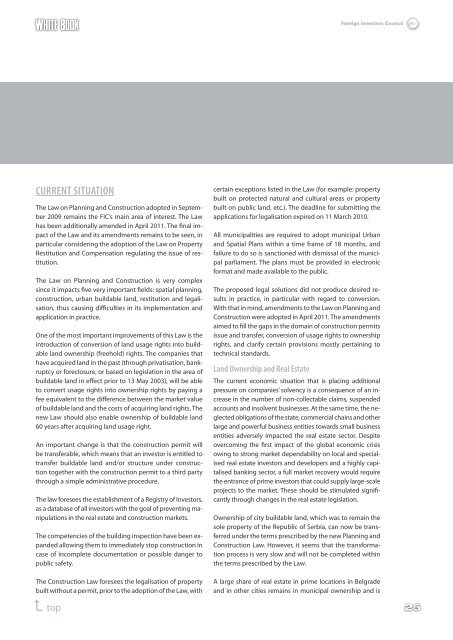Fic rEcommEndationS - Eurobank EFG
Fic rEcommEndationS - Eurobank EFG
Fic rEcommEndationS - Eurobank EFG
You also want an ePaper? Increase the reach of your titles
YUMPU automatically turns print PDFs into web optimized ePapers that Google loves.
cUrrEnt SitUation<br />
The Law on Planning and Construction adopted in September<br />
2009 remains the FIC’s main area of interest. The Law<br />
has been additionally amended in April 2011. The final impact<br />
of the Law and its amendments remains to be seen, in<br />
particular considering the adoption of the Law on Property<br />
Restitution and Compensation regulating the issue of restitution.<br />
The Law on Planning and Construction is very complex<br />
since it impacts five very important fields: spatial planning,<br />
construction, urban buildable land, restitution and legalisation,<br />
thus causing difficulties in its implementation and<br />
application in practice.<br />
One of the most important improvements of this Law is the<br />
introduction of conversion of land usage rights into buildable<br />
land ownership (freehold) rights. The companies that<br />
have acquired land in the past (through privatisation, bankruptcy<br />
or foreclosure, or based on legislation in the area of<br />
buildable land in effect prior to 13 May 2003), will be able<br />
to convert usage rights into ownership rights by paying a<br />
fee equivalent to the difference between the market value<br />
of buildable land and the costs of acquiring land rights. The<br />
new Law should also enable ownership of buildable land<br />
60 years after acquiring land usage right.<br />
An important change is that the construction permit will<br />
be transferable, which means that an investor is entitled to<br />
transfer buildable land and/or structure under construction<br />
together with the construction permit to a third party<br />
through a simple administrative procedure.<br />
The law foresees the establishment of a Registry of Investors,<br />
as a database of all investors with the goal of preventing manipulations<br />
in the real estate and construction markets.<br />
The competencies of the building inspection have been expanded<br />
allowing them to immediately stop construction in<br />
case of incomplete documentation or possible danger to<br />
public safety.<br />
The Construction Law foresees the legalisation of property<br />
built without a permit, prior to the adoption of the Law, with<br />
� top<br />
certain exceptions listed in the Law (for example: property<br />
built on protected natural and cultural areas or property<br />
built on public land, etc.). The deadline for submitting the<br />
applications for legalisation expired on 11 March 2010.<br />
All municipalities are required to adopt municipal Urban<br />
and Spatial Plans within a time frame of 18 months, and<br />
failure to do so is sanctioned with dismissal of the municipal<br />
parliament. The plans must be provided in electronic<br />
format and made available to the public.<br />
The proposed legal solutions did not produce desired results<br />
in practice, in particular with regard to conversion.<br />
With that in mind, amendments to the Law on Planning and<br />
Construction were adopted in April 2011. The amendments<br />
aimed to fill the gaps in the domain of construction permits<br />
issue and transfer, conversion of usage rights to ownership<br />
rights, and clarify certain provisions mostly pertaining to<br />
technical standards.<br />
Land ownership and real Estate<br />
The current economic situation that is placing additional<br />
pressure on companies’ solvency is a consequence of an increase<br />
in the number of non-collectable claims, suspended<br />
accounts and insolvent businesses. At the same time, the neglected<br />
obligations of the state, commercial chains and other<br />
large and powerful business entities towards small business<br />
entities adversely impacted the real estate sector. Despite<br />
overcoming the first impact of the global economic crisis<br />
owing to strong market dependability on local and specialised<br />
real estate investors and developers and a highly capitalised<br />
banking sector, a full market recovery would require<br />
the entrance of prime investors that could supply large-scale<br />
projects to the market. These should be stimulated significantly<br />
through changes in the real estate legislation.<br />
Ownership of city buildable land, which was to remain the<br />
sole property of the Republic of Serbia, can now be transferred<br />
under the terms prescribed by the new Planning and<br />
Construction Law. However, it seems that the transformation<br />
process is very slow and will not be completed within<br />
the terms prescribed by the Law.<br />
A large share of real estate in prime locations in Belgrade<br />
and in other cities remains in municipal ownership and is<br />
25




